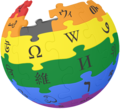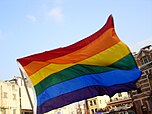Portal:LGBTQ
| Main page | WikiProjects & Things you can do |

|
The LGBTQ+ Portal |

|

|

|
Introduction LGBTQ (also commonly seen as LGBT, LGBT+, LGBTQ+, and LGBTQIA+) is an initialism for lesbian, gay, bisexual, transgender and queer or questioning. It is an umbrella term, broadly referring to all sexualities, romantic orientations, and gender identities which are not heterosexual, heteroromantic, or cisgender. In the 1990s, gay, lesbian, and bisexual activists adopted the term LGB, supplanting narrower terms such as "gay or lesbian". Terminology eventually shifted to LGBT, as transgender people became more accepted within the movement. Around that time, some activists began to reclaim the term queer, seeing it as a more radical and inclusive umbrella term, though others reject it, due to its history as a pejorative. In recognition of this, the 2010s saw the adoption of LGBTQ, and other more inclusive variants. Some versions of the term, such as LGBT+ and LGBTQ+ add a plus sign, to represent additional identities not captured within the acronym. Many further variants exist which add additional identities, such as LGBTQIA+ (for intersex, asexual, aromantic, and agender) and 2SLGBTQ+ (for two-spirit), LGBTQQ (for queer and questioning), or which order the letters differently, as in GLBT and GLBTQ. The collective of all LGBTQ people is often called the LGBTQ community. These labels are not universally agreed upon by everyone that they are intended to include. For example, some intersex people prefer to be included in this grouping, while others do not. Various alternative umbrella terms exist across various cultures, including queer; same gender loving (SGL); and Gender, Sexual and Romantic Minorities (GSRM). (Full article...) Selected article -The Women's March on Portland, also known as the Portland Women's March, the Women's March on Washington, Portland, and Women's March Portland, was an event in Portland, Oregon. Scheduled to coincide with the 2017 Women's March, it was held on January 21, 2017, the day after the inauguration of Donald Trump. The march was one of the largest public protests in Oregon's history with crowd estimates as high as 100,000 participants. No arrests were made during the demonstration. Plans for the Portland march began with a small group of women in Eastern Oregon on November 11, 2016, following Trump's election. Thousands of people expressed interest in attending the event on its Facebook page just days after its creation. Organizers wanted to focus on women's rights but were criticized for not addressing issues of diversity. On December 27, Oregon's liaison to the national Women's March overtook the original event page. A new page was created, inviting participation by a group of women who had complained about the lack of diversity. Margaret Jacobsen became the march's lead organizer on January 6, 2017. (Full article...) Selected biography -John Michael Stipe (/ˈstaɪp/; born January 4, 1960) is an American singer, songwriter and artist, best known as the lead singer and lyricist of the alternative rock band R.E.M. Stipe was born in Metro Atlanta in January 1960. Due to his father's military commission his family moved constantly, with Stipe spending part of his childhood in West Germany before finishing high school in suburban St Louis. Stipe attended the University of Georgia in Athens, where he became involved in the local college rock and jangle pop scene. He formed R.E.M. after meeting his bandmates at the university and soon dropped out to pursue music with them. The band issued its debut single, "Radio Free Europe," and subsequently signed to I.R.S. Records, meeting wide acclaim and soon great commercial success. (Full article...) Selected quote -
—Emma Goldman (1869–1940)
Current events
Selected image - The Swimming Hole (1884–85) is a painting by Thomas Eakins. It is perhaps the most famous work by Eakins and considered a masterpiece of American painting. In this work, Eakins took advantage of an exception to the generally prudish Victorian attitude to nudity: swimming naked was widely accepted, and for males was seen as normal, even in public spaces. Eakins was the first American artist to portray swimming in the nude. By the 1970s some American writers were beginning to see Eakins' work, and specifically The Swimming Hole, as having homoerotic overtones. However, Eakins' (homo-)sexuality has never been conclusively determined.
Did you know… -
This month's birthdays
Selected listsRelated portalsFeatured contentThe following articles and lists have been identified as some of the best produced by the Wikipedia community:
TopicsCategoriesAssociated WikimediaThe following Wikimedia Foundation sister projects provide more on this subject:
Discover Wikipedia using portals |
























